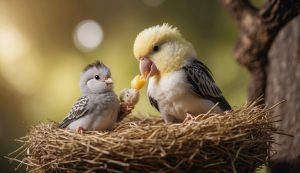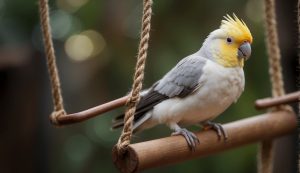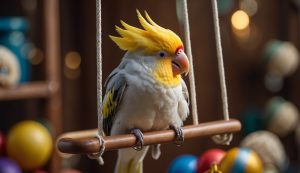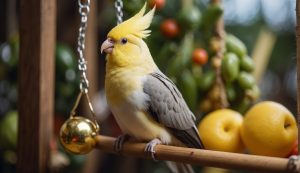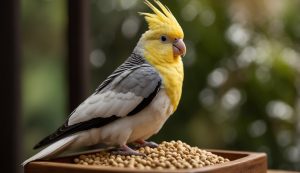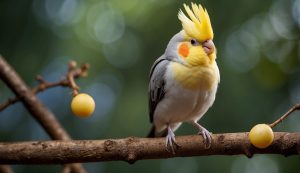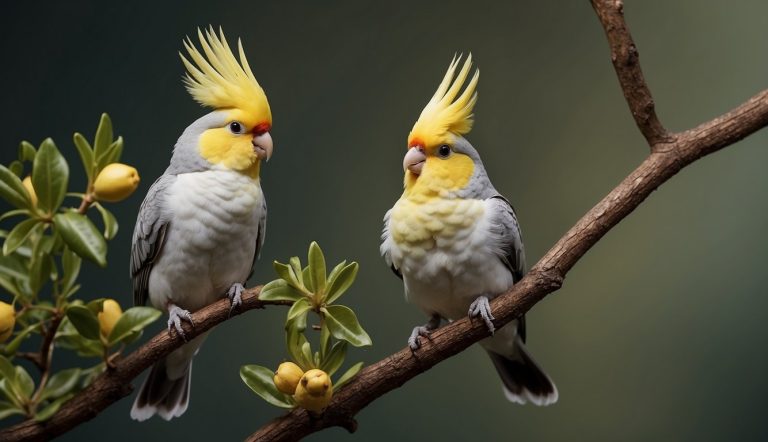Why Is My Cockatiel Screaming? Understanding Your Feathered Friend’s Vocal Behavior

Cockatiels are beloved for their charming personalities and vocal nature, yet sometimes their behavior leaves owners puzzled, particularly when it comes to screaming.
As a cockatiel owner, I understand the cacophony that can often fill a household when our feathered friends become vocal. This behavior serves as a mode of communication, and while it can be endearing, excessive screaming may signal that your pet needs attention or that there are aspects of its environment or care that require adjustment.
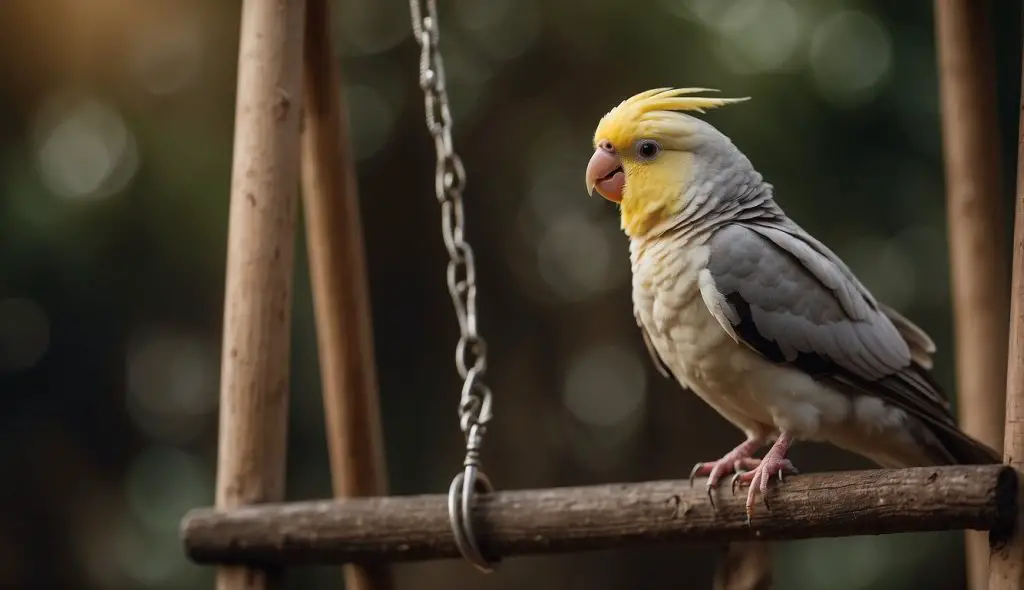
Understanding why cockatiels scream necessitates a look into their natural habits and needs. It’s no secret that these birds can be quite vocal, but an increase in screaming could be the result of various factors ranging from a desire for interaction to the mimicking of sounds they find stimulating.
Through observation and a bit of know-how, I’ve learned to decipher these calls and provide the necessary care to make sure my cockatiel feels safe, secure, and engaged, thus reducing the need for incessant screaming.
Key Points
- Excessive screaming in cockatiels can be a signal from the bird for attention or changes in their care.
- A cockatiel’s vocalizations are a natural form of communication, and understanding them is key to a happy bird.
- Creating a stimulating environment and employing behavioral strategies can help manage and reduce a cockatiel’s screaming.
Table of Contents
Why Do Cockatiels Make Noise?
In my experience, cockatiels vocalize for a variety of reasons, most of which are natural behaviors for these social birds. They communicate with their flocks and express their needs and feelings through different sounds.
Normal Behaviors and Vocal Patterns
As a cockatiel owner, I’ve learned that these birds have a repertoire of sounds, each with its own purpose.
Whistles and chirps are common, showing contentment and actively engaging with their surroundings. Cockatiels often perform a morning and evening ‘flock call’, which is a natural instinct to confirm the presence and well-being of their flock. If my bird is alone, I become part of his perceived flock, and he vocalizes to check in with me.
Calls for Flock and Communication
When it comes to flock calls or attempts to communicate, my cockatiel tends to be quite vocal. He uses loud calls to indicate his need for attention or to alert me if he’s feeling distressed.
In the wild, being vocal helps cockatiels keep track of each other within the foliage. At home, my bird calls out if I leave the room, essentially doing a roll call to ensure his flock – in this case, me – is still close by.
Common Causes of Screaming
In my experience with cockatiels, when they scream, it often traces back to something specific in their environment, unmet physical or emotional needs, or even indicators of distress due to illness or injury.
Environmental Factors
My cockatiel’s environment plays a crucial role in its well-being. Factors such as excessive noise, lack of stimulation, or improper lighting can cause significant stress, leading to screaming.
I’ve noticed that if the cage is positioned in a high-traffic area, the constant activity might overwhelm my bird, causing it to scream in an attempt to assert its presence or territory.
Ensuring a calm, engaging, and well-structured habitat is essential for minimizing stress-related behaviors.
Physical and Emotional Needs
I’ve learned that much like humans, cockatiels have complex emotional needs, including the need for interaction and companionship.
If I neglect my cockatiel, it may scream out of loneliness or boredom. Regular, meaningful engagement is vital.
Additionally, the screaming might be a plea for attention if they are not getting enough mental stimulation through toys and activities. It’s also important to consider their routine; consistent schedules and enough sleep are foundational for a contented cockatiel.
Signs of Distress or Illness
Screaming can also signal that my cockatiel is frightened, in pain, or unwell.
Sudden loud screams may indicate that the bird is frightened or experiencing separation anxiety. If the bird is persistently screaming, it could be a sign of injury, discomfort, or illness. In such cases, monitoring for other symptoms is critical, and a prompt visit to the vet could be necessary.
Any hint of predators, even just outside a window, can induce a fear response leading to screaming. It’s always best to investigate any changes in sounds or behavior to ensure the health and safety of my feathered friend.
Behavioral and Training Strategies
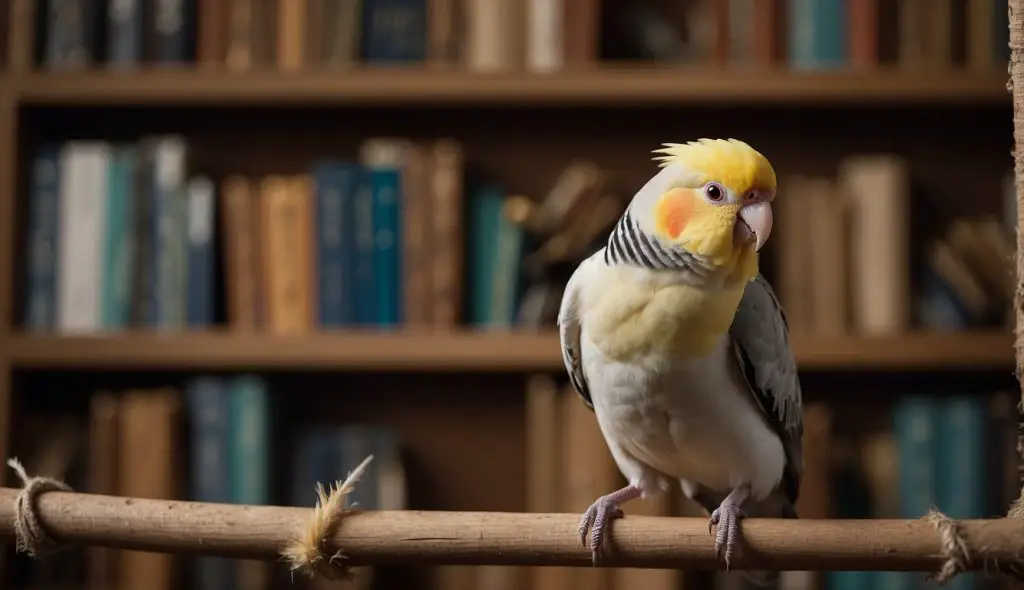
To manage my cockatiel’s screaming, I’ve found that addressing behavioral issues with appropriate training strategies to be effective. Let’s explore the specifics.
Routine and Consistency
I ensure my cockatiel is on a consistent daily routine to provide a sense of security and predictability. This includes setting regular times for waking up, feeding, play, and bedtime. A steady routine helps prevent stress-related behaviors, including excessive screaming.
Training and Positive Reinforcement
For training my bird, I use positive reinforcement techniques.
Whenever my cockatiel remains calm or follows a command, I reward it with treats or affection. I’ve taught several tricks and commands to not only enrich its skills but to also build a bond and deter unwanted screaming.
Dealing with Excessive Screaming
When my cockatiel exhibits excessive screaming, I assess my own behavior to ensure I’m not inadvertently reinforcing the noise.
I focus on calming strategies and do not react to the screaming as this can encourage it. Instead, I reinforce quiet behavior and use distraction techniques to redirect my bird’s attention.
Frequently Asked Questions
Cockatiels are social creatures known for their expressive vocalizations, and their screams can often be attempts at communication or expressions of various needs.
Let’s explore some common inquiries about why these engaging birds might raise their voices.
What prompts my cockatiel to scream in the early hours?
My cockatiel may scream in the early hours as a natural response to the sunrise. They are diurnal animals, so this is their way of greeting the day and signaling their wakeup to the flock.
What could be causing my cockatiel to scream at dusk?
At dusk, my cockatiel might scream because it’s trying to signal that it is time to settle in for the night. This evening calling can also be a final check to ensure the flock is together before dark.
How can one interpret a cockatiel’s scream?
Interpreting my cockatiel’s scream depends on the context; it could be due to excitement, fear, discomfort, or a call for attention. I pay attention to what’s happening around them to understand the cause.
What factors may lead to my cockatiel screaming even when everything seems normal?
If my cockatiel screams even when everything seems normal, they might be bored or seeking interaction. Cockatiels need mental stimulation and may scream to express their dissatisfaction with the current level of activity or engagement.
Could the reason behind my cockatiel’s screams be related to its gender?
The reason behind my cockatiel’s screams could be partly related to its gender, as males are typically more vocal and use screaming for mating calls or to establish territory.
Why does my cockatiel start screaming whenever I exit the room?
My cockatiel might start screaming when I leave the room. This could be because it has developed separation anxiety or simply wishes to maintain contact. Cockatiels are flock-oriented birds that do not like to be alone.

